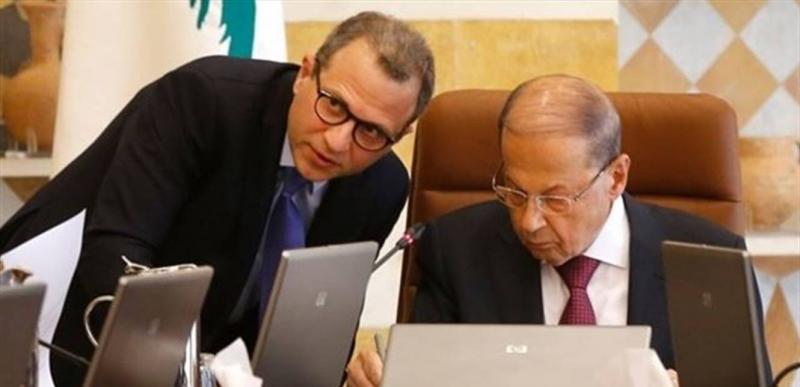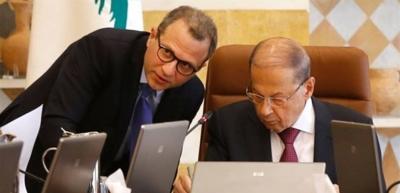President Michel Aoun has only five months left in Baabda Palace, marking the end of his constitutional term. Similarly, the leader of the Free Patriotic Movement, MP Gebran Bassil, has only these five months to outline a strategy for both before and after the end of the term. Away from the debate over the possibility of Aoun staying in Baabda Palace or leaving it on the night of October 31, the next five months may seem, to some, equivalent to the five and a half years that have passed so far.
In this context, Aoun will not accept what he has not accepted before, and both he and Bassil will not hand over power quietly and smoothly, just as they did not relinquish it throughout the presidential term, especially since the countdown has begun. The parliamentary elections have heightened Aoun's genuine fears and concerns regarding the path of his successor and his political movement, as the outcomes within the movement during the elections raise serious questions about what awaits after the night of October 31.
Aoun and Bassil act as if their opponents consider them "finished" in the political sense, and that the end of the term will seal, with a red wax stamp, a political phase lasting at least thirty years. As both are aware of their opponents' thinking and their hostile stance eagerly awaiting the end of October, they strive to turn the tables. They behave according to the principle that "continuity" will remain intact, that Aoun's presidency will not end in a literal sense—at least politically—and that the Free Patriotic Movement will continue to exist with rising strength.
Therefore, Bassil will play the same political game until the last breath of the term that he has grown accustomed to over the past five years and even before that. What will transpire from now on will be the exhaustive utilization of all means to obtain what he desires and bolster his political position in the parliamentary elections in all its forms—from the vice presidency of the council to the council's bureau to committees, government formation, and acquiring the portfolios he wants, ultimately reaching the presidency.
He relies, in all these phases, on the President's fundamental right to sign government decrees. This essential card that Aoun still holds forms Bassil's leverage in regaining his status as a negotiator, challenger, or obstructer in the formation of the government unless he gets what he wants.
Bassil will not make it easy for his opponents, even for his allies, in the coming five months; rather, he will be more stringent as he plays his final game. It will be difficult for his allies—who contributed to strengthening his parliamentary share to ensure the next phase—to convince him to part with portfolios he considers an acquired right. He will find himself in a sensitive position trying to balance what his dwindling allies, limited to Hezbollah, want from him with the strategy he desires to ensure his position and that of the movement from now until the presidential elections and beyond.
Hezbollah has very different calculations at this stage, and its strategy for the coming months may not necessarily align with the vision of its ally, who contributed to its success. Moreover, he will have to heed his other ally, President Nabih Berri, as one of the political group waiting eagerly for the last five months, and the party will not be able to convince him either to offer gifts to a regime that is ending and a movement it has opposed since 2005, which still continues to do so.
Conversely, Bassil approaches his opponents from the perspective of continuity at any cost. However, the problem is that his opponents and allies are well aware that his main battle has begun within the Free Patriotic Movement. The analysis of the votes his deputies received, regardless of the number of seats, serves as a wake-up call within the movement and not just in the Christian street. The leadership problem in the movement is that it has not dealt realistically with what transpired and with the distribution of votes in key districts, as what occurred is one of the indicators the movement should address seriously as the end of the term approaches.
The performance of both current and former deputies in the movement and those responsible for it will be scrutinized as the zero hour draws nearer, and the overall condition of the movement will be under the microscope, adding to Bassil’s complications, especially since Aoun's aura and presidential position still provide cover for Bassil both within the movement and in political circles.
However, it's worth noting that three of the candidates Aoun personally pushed for strongly were defeated in favor of other candidates. This does not bode well for the "continuity" that the Aounist and subsequently Bassilist base is supposed to secure for the movement that Aoun launched in the 1990s.
Bassil wishes to prove to everyone that the movement is still strong and that the outgoing presidency still exists robustly through continuity. Thus, the political reality will see the level of battles escalated to the maximum, employing the same tactics he has used in past battles and elections, without paying attention to the number of losses accrued along the way.




